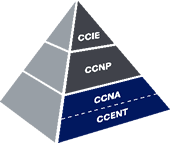CCNA Certification
The Cisco CCNA network associate certification
validates the ability to install, configure, operate, and
troubleshoot medium-size routed and switched networks, including
implementation and verification of connections to remote sites in a
WAN. This new curriculum includes basic mitigation of security
threats, introduction to wireless networking concepts and
terminology, and performance-based skills. This new curriculum also
includes (but is not limited to) the use of these protocols: IP,
Enhanced Interior Gateway Routing Protocol (EIGRP), Serial Line
Interface Protocol Frame Relay, Routing Information Protocol Version
2 (RIPv2),VLANs, Ethernet, access control lists (ACLs)
Cisco CCNA Certification: Introduction
The CCNA (Cisco Certified Network Associate)
Certification is a foundation and beginner level of networking and
the only exam required to achieve Cisco Routing and Switching
certification at Associate Level.
CCNA is for individuals who are interested in
building a future in networking domain on Cisco products. CCNA
Certification is the prerequisite for any Cisco Certification. If
you want to reach a Professional or Expert level in the Cisco Career
Certification tracks, Passing CCNA test is the first step.
|
Cisco has revised its exam pattern and included
new question types to make the exam more
practical in nature, covering all hands-on
tasks. The exam includes following types of
questions:
- Simulation (Router and Switching)
- Drag and Drop
- Multiple Choice (Single Response)
- Multiple Choice (Multiple Response)
- Fill in the Blanks
|
Option 1:
You need to clear the following
1 exam:
| CCNA
640-801 : Introduction to Cisco
Networking Technologies and Interconnecting
Cisco Networking Devices |
Option 2: You need to clear the following 2
exams. The above-mentioned exam is actually
segregated into these 2 exams:
| 640-821 INTRO Beta: Introduction to
Cisco Networking Technologies (INTRO) |
| 640-811 ICND: Interconnecting Cisco
Networking Devices |
|
Benefits of CCNA Certification
|
- In general, Cisco Certification
validates an individual's achievement, so it increases
the holder's professional credibility by ensuring high
standards of technical expertise.
- In particular, passing the CCNA test
indicates knowledge of networking for small to big
enterprises. It also confirms the ability to work in
small businesses or organizations whose networks have
fewer than 100 nodes.
- You need to have CCNA for achieving
higher Cisco Certifications.
|
A CCNA can do the following:
|
- Install, configure, and operate LAN,
WAN, and dial access services for small works of less
than 100 nodes.
- Expertise in use of IP, IGRP, Serial,
Frame Relay, IP RIP, VLANs, RIP, Ethernet, and Access
Lists protocols.
- Install and configure Cisco switches
and routers in multiprotocol internetworks using LAN and
WAN interfaces.
- Provide Level 1 troubleshooting
service.
- Improve network performance and
security.
|
